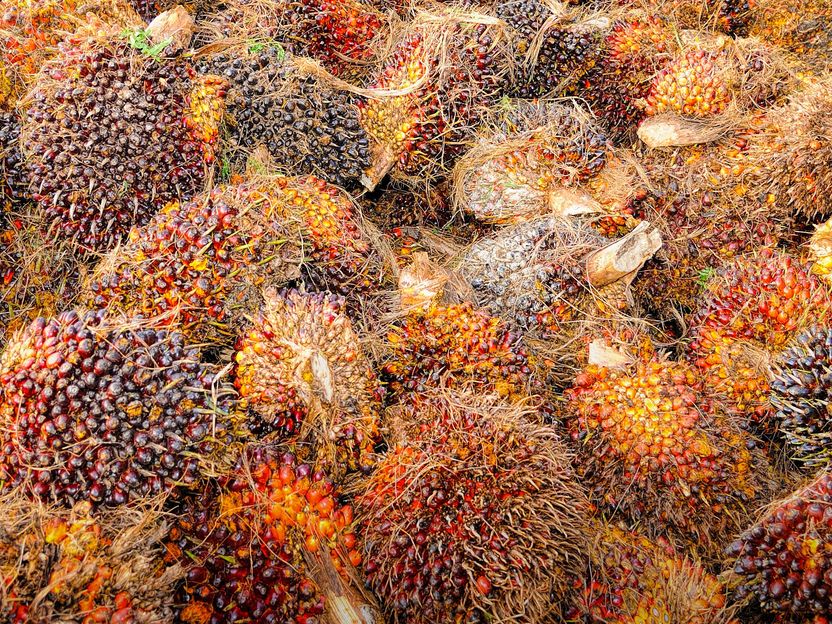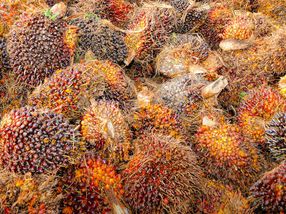Palm oil: Substitutes may make matters worse
ETH Zurich Zukunftsblog, author: Dr. Gabriele Manoli

Annual yield, land use and water consumption for oil palm and other oilseed crops.
Gabriele Manoli / ETH Zürich

pixabay/tristantan


Palm oil is a highly controversial product. However, replacing it with other vegetable oils could endanger land and water resources, argues Gabriele Manoli.
Palm oil stands at the centre of an intense and often polarised debate1. While the massive expansion of oil palm across the tropics has undoubtedly helped to alleviate poverty, it has also contributed to deforestation, carbon emissions, and significant losses of biodiversity. But are alternatives to oil palm any more sustainable? Can we satisfy the booming global demand for vegetable oil while saving land and water by growing alternative crops?
Unbeaten productivity
There’s no easy answer. Palm oil is widely used for domestic cooking in Asia, Africa, and South America, and is an ingredient in many food (e.g. cookies, chocolate, ice cream) and non-food (e.g. shampoo, cosmetics, biofuel) products consumed every day. Possible candidates for replacing oil palm – for both food and biofuel production – include coconut palm, sunflower, soybean, and rapeseed. Yet oil palm has higher productivity per hectare than any other widely grown vegetable oil crop: four to nine times as much land is required to produce the same amount of vegetable oil from either coconut, sunflower, soybean or rapeseed.
The high productivity of oil palm does, however, come at the expense of considerable water consumption. As we recently demonstrated2, pressures on local water resources are substantial: mature large-scale plantations transpire even more water than tropical forests, potentially causing water scarcity in oil palm-dominated landscapes3. Other vegetable oil crops require only 30-70% of the water used by oil palm.
On the other hand, water consumption per kg of oil produced is lower than for other oil crops due to the smaller land requirement of oil palm. Biodiesels derived from oil palm consequently have the lowest water footprint, along with rapeseed.
“Simply boycotting products containing palm oil is unlikely to achieve the environmental benefits that we might hope for.” Gabriele Manoli
So it is simplistic to uniquely vilify oil palm as an environmental scourge. All crops grown as large-scale monocultures have environmental impacts, and any fair comparison needs to take into account not only changes in land cover, such as clearance of forests, but also the amount of land needed to meet global demand. We also need to consider the extent of pesticide and herbicide use in cropping systems (low for oil palm), as well as the demands placed on water resources (high for oil palm). And if we assess environmental impacts according to yield, oil palm fares rather better than other vegetable crops.
Simply boycotting palm oil and substituting it with other vegetable oil crops is unlikely to achieve the environmental benefits that we might hope for. On the contrary, by endangering land and water resources, we might even be driving more environmental damage.
So what’s to be done?
In our view, a more credible alternative is sustainable palm oil. Zero-deforestation commitments are beginning to shift oil palm plantation development towards other land covers, including pasture and previously cleared land. This reduces carbon emissions and biodiversity losses, while continuing to provide economic opportunities for rural communities.
Smallholder plantations and agroforestry systems that adopt good practice guidelines for oil palm cultivation can reduce the impacts of large-scale monocultures that dominate landscapes. Yet scaling up sustainable practices across smallholder communities is difficult, as these small-scale farmers have limited capacity and resources. Indeed, many often cannot afford basic resources such as seeds and fertilizers4.
To resolve the oil palm controversy, we believe that in addition to promoting good agricultural practices, favourable policies and economic incentives should be put in place to support smallholder farming systems and secure the sustainability of both livelihoods and the environment.
Original publication
1.) The palm oil debate: The Guardian, Zukunftsblog und IUCN
2.) Manoli G et al. (2018). Ecohydrological changes after tropical forest conversion to oil palm, Environmental Research Letters,
3.) Merten J et al. (2016). Water scarcity and oil palm expansion: social views and environmental processes. Ecology and Society, 21(2).
4.) Yan W (2017). A makeover for the world's most hated crop. Nature News, 543(7645), 306.




























































